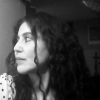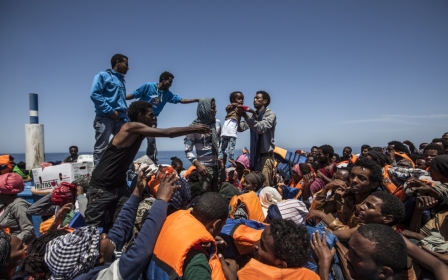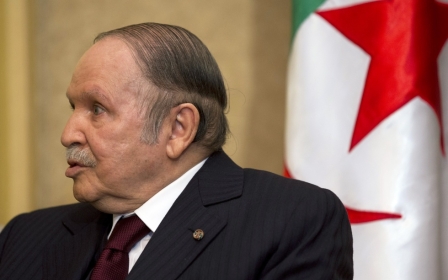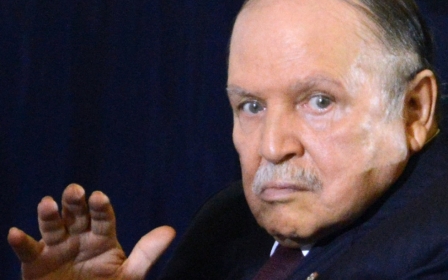Charlie Hebdo: The spectre of the 'years of lead' for Algerian journalists
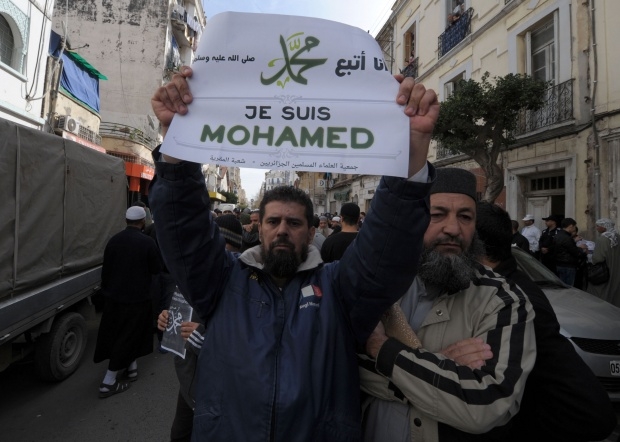
The attack against Charlie Hebdo has revived memories of the Algerian civil war. The publication of a new representation of the Prophet Muhammad also provoked demonstrations in Algiers.
When he heard about the attack against the office of Charlie Hebdo, the Algerian journalist Akram Belkaïd felt that an old fear, which he thought was carefully buried under the everyday routine of his Parisian life, was coming back. “All of a sudden, a host of images resurfaced. I immediately thought of all the attacks against Algerian newspapers and journalists which took place during the Algerian civil war. My memories of these ‘years of lead’ have never totally disappeared, and this feeling of having to be vigilant all the time, of having to be on the alert and of fearing every day for one’s life, has somewhat come back to the surface.”
The Algerian civil war, as called by the media - Akram Belkaïd always calls it “that time”. 1988: premises of “that time”, Algeria reels dangerously. Its planned economy, totally dependent on fuel, suffers from the brutal downfall of oil prices. Endemic unemployment strikes a disillusioned youth who finds some sterile outlets in the sermons at the mosque or in a fantasised emigration.
On the political level, the National Liberation Front, the single party, sees the legitimacy it gained from the War of Independence challenged. On 5 October 1988, spontaneous demonstrations take place all over the country. The Algerian army shoots at the crowds – a brutal crackdown which fuels the tensions. Cornered, the Algerian authorities undertake institutional reforms. Some political parties are established, including the Islamic Salvation Front (FIS).
In December 1991, the FIS wins the first round of the legislative elections. The nomination of an Islamic government seems then ineluctable. But on 11 January 1992, the army, presenting itself as the punctilious custodian of the 1962 heritage, orders the plain and simple invalidation of the elections. The state of emergency is proclaimed, the FIS is dissolved, and thousands of its members are jailed. The Islamists then turn to armed underground action. The war which begins between the Algerian state and the Islamic groups is merciless, killing 150,000 between 1991 and 2001, according to official sources. This “invisible war”, as described by historian Benjamin Stora, is marred by massacres of the civilian population.
Journalists on the front line
During this latent war, hundreds of journalists and media workers are assassinated by armed groups. Everything begins with a fatwa on December 1992 stipulating that journalists, like the army, are enemies. It is relayed in all the mosques held by the Islamic Salvation Front. Hassane Zerrouky, at the time a journalist at Le Matin newspaper, recalls: “Mourad Si Ahmed, nicknamed el-Afghani, one of the emirs of the Armed Islamic Group (GIA), had expanded the armed struggle to the fight against journalists. His watchword was straightforward: 'Those who fight us with the quill will die by the blade.' Four of my colleagues were assassinated and our office was partially destroyed by two booby-trap car bomb attacks.”
Tahar Djaout, director of the magazine Ruptures, was the first journalist killed by the Islamists. His famous line, “Silence is dead. If you keep silent you die. If you speak you die. So speak and die!”, became the motto of the Algerian press. Symbolically, this slogan was widely circulated on the French social media after the Charlie Hebdo events, like a last epitaph to the fallen journalists.
Another emblematic journalist, shot dead by an armed commando in December 1994, was Saïd Mekbel, founder of the French-language newspaper Le Matin. His last article, “This thief who”, expresses the pervasive terror: “This thief who comes back home by night hugging the walls, it is him. This father who advises his children not to tell others the bad profession of his dad, it is him ... This man who vows not to be slaughtered to death, it is him. He, who is all of them, is only a journalist.”
Twenty years later, Hassane Zerrouky describes the daily life of the time, which foundered sometimes into the most absurd madness: “We had noticed that assassinations of journalists took place generally on Tuesdays. We eventually understood that in the jihadist circles there was the belief that on that day the gates of Paradise were closed. They waited for that day to kill us. From 1993 to 1999, cemeteries became the meeting place of journalists, either dead or alive.”
Stupefaction with a sense of déjà vu
The modus operandi of the attack against Charlie Hebdo, with two armed men storming into the outlet, reminds Akram Belkaïd of the attack against the daily Hebdo Libéré in March 1994: “Five men came to the newspaper, presenting themselves as plainclothes policemen. They came on the day of the wrapping up, thinking that they would find all the editorial team. Luckily, we avoided bloodshed because the staff had been relocated into another building. But two persons, including a photographer, were killed on that day, and three employees were seriously injured.”
The headquarters of the newspapers Le Soir d’Algérie, Alger Républicain and Le Matin were also destroyed or damaged in separate attacks.
Zerrouky stresses the inability of the Algerian state to protect journalists: “The Algerian state was overwhelmed. Some suburban neighbourhoods of Algiers had fallen to the Islamists and the authorities were on the defensive. They may also have belittled the seriousness of what was going on. Retrospectively, I am still bewildered and I tell myself that it was a close call. Algiers had become almost comparable to Baghdad, with booby-trapped cars exploding every day. Some Western intelligence services even thought that in the short term Algeria would become a new Afghanistan.”
To the mere powerlessness of the state, Zerrouky, who now works for the French newspaper L’Humanité, adds: “We found ourselves between the devil and the deep blue sea. Islamists were threatening to kill us, and the state, when it was displeased by an article, threatened us with censorship, prosecution and even closure. We had to fight on both fronts.”
Faced with this dramatic situation, many Algerian journalists and intellectuals chose exile. According to some estimates, 400,000 Algerians decided to leave their country; most went to the United States and Canada. “It was a massive exodus of the living forces of the country, and Algeria is still paying the price today,” concludes Zerrouky.
What about international support?
Following the international outcry caused by the attack against Charlie Hebdo, Omar Belhouchet, director of the emblematic daily El-Watan, declared on the French radio station France Culture: “Unfortunately, the Algerian media did not enjoy such international rallying. Only the organisations fighting for the protection of journalists supported us.”
The same stark observation is made by Zerrouky: “There was no show of solidarity for us. The massacres were scandalously proceeding behind closed doors. Some foreign media even implied that the Islamists were not behind the killings, although a branch of the GIA, the Islamic Front for Armed Jihad, openly claimed responsibility for the assassinations of journalists.”
Akram Belkaïd, a freelance journalist in Paris, sounds less clear-cut: “Of course we did not enjoy the same international support as Charlie Hebdo did. But if we look closer, the London and Madrid attacks did not either. There was some show of solidarity; people like the sociologist Bourdieu created a support committee for the Algerian intellectuals. Reporters Without Borders was also very active. We should not forget that, back then, the world was powerless.”
The shockwave of Charlie Hebdo
In addition to terrible memories being revived, there is also the diffuse fear that the shockwave of the Charlie Hebdo attack may reawaken the spectre of civil war in an Algerian society which has never totally been pacified.
Indeed, the publication of a special issue of Charlie Hebdo featuring another representation of the Prophet Muhammad on its cover prompted thousands to demonstrate in Algiers on 16 January. Demonstrators brandished placards reading in French and Arabic: “I am Muhammad,” in reference to the “Je suis Charlie” [I am Charlie] used in France after the attack.
“An atmosphere of the early 1990s,” writes the Algerian media, which worriedly points to other slogans heard during the march. For instance, some demonstrators chanted “For the Islamic Republic we live, for it we will die,” a FIS phrase used before the civil war.
Akram Belkaïd tempers the concerns and observes: “It is not ‘the’ Algerians but ‘some’ Algerians who protested on Friday. Besides, this demonstration took place at the end of Friday prayers.” However, he wonders how the demonstrators managed to march in the streets of Algiers whereas the right to protest is not recognised in Algeria: “Was it spontaneous or did they have authorisation? In that case, why were they allowed to demonstrate? What do the Algerian authorities hope?”
Those questions are all the more pertinent given that President Bouteflika “vigorously” condemned the terrorist attack against Charlie Hebdo in the condolences he addressed to François Hollande. He said in his message: “The Algerian people, who suffered for years from the throes of terrorism, understand the emotion of the friendly French people.”
Zerrouky is concerned and denounces a demonstration “whose phrases remind us of those which plunged Algeria into chaos.” He says: “During the recent democratic demonstrations in Algiers, 15,000 policemen were deployed. When it tried to demonstrate, the Barakat Movement [a civil society movement created in protest against the fourth presidential term of Bouteflika in April 2014] was met by the police. To those seeking democracy, the authorities send batons, and to the Islamists, they give the authorisation to protest.”
He adds: “A good number of Islamists have realised that jihad was counter-productive and opted for the compromise proposed by Bouteflika when he issued the Amnesty Law of 2005. Their aim is to occupy the space again and come back to the fore and reconstitute their forces. The Charlie Hebdo affair was only a pretext. It gave the Islamists the opportunity to demonstrate and assess the real status of their strength. We saw the result on Friday in Algiers.”
- Hassina Mechaï is a French-Algerian journalist based in Paris. She holds a Masters Degree in Law and one in International Relations and is specialised in Africa and Middle East affairs. Her topics of reflexion are world governance, civil society and public opinion, and media and cultural soft power. She has worked for various French, African and Arab media, including Le Point, RFI, Afrique Magazine, Africa 24, Al Qarra, and Respect Magazine.
New MEE newsletter: Jerusalem Dispatch
Sign up to get the latest insights and analysis on Israel-Palestine, alongside Turkey Unpacked and other MEE newsletters
Middle East Eye delivers independent and unrivalled coverage and analysis of the Middle East, North Africa and beyond. To learn more about republishing this content and the associated fees, please fill out this form. More about MEE can be found here.


